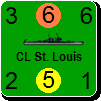heliodorus04
Posts: 1647
Joined: 11/1/2008
From: Nashville TN
Status: offline

|
quote:
ORIGINAL: IdahoNYer
As BigAnorak said "Maybe more people should play the Operation Barbarossa scenario. This is specifically designed so the Axis can ignore the Blizzard (It lasts 25turns) and the VPs are based on the actual OKH objectives for the first 6 months.
This really is the opportunity for the Germans to go all out, and then see how they match up to what was expected of their historical counterparts."
This is the concept that the campaign currently lacks - the "kick in the door, the hole regime collapse" possibility that changes the feel of the game in the campaign. If this could somehow be implemented into the campaign - to continue on potentially through to the end of war, but maintain the original German objectives just till end Dec 41 for a Soviet collapse. If the Germans do not achieve this, the war grinds on. But if they achieve lets say that Decisive Victory for the Barbarossa Scenario victory conditions, game over.
A nice idea, but if that's what the German player wants, then the Barbarossa scenario is all they should try for that objective.
The problem with creating a decisive victory that the Germans can achieve in 1941 is one of gameplay. If it's possible to do, then it creates a lopsided year of play that the Soviet player doesn't get a lot of fun out of. It's a one-dimensional game: German offense/Soviet defense. He plays his 30 or so turns, loses, and it probably wasn't fun because the German took historically implausible paths to that early decisive victory.
And if the German player tries for that early, 1941 decisive victory, but doesn't get it, then from a gameplay standpoint, he's probably compromised his game in such a way that it will hurt him the rest of the war. For example, he over-extends in mud/snow and doesn't achieve the Decisive, at which point he can expect to be brutalized in Blizzard, possibly worse than historical, for having dared to achieve the "Typhoon Collapse" and failing. This encourages him to walk away from the PBEM at some point and say "I lost too much in 1941, and now you'll be in Poland by 43".
These are my opinions, of course.
I don't know if any of you guys played Starcraft, but there was this strategy called the "6-pool rush" where a zerg player could try to quickly get the first six combat units out and attack the other player when 6 outnumbered him pretty well if he didn't assume the zerg was trying that strategy. If the zerg was right and the other player hadn't prepared, the game usually was won there early by the zerg. If the zerg was wrong, and the other player prepared, the zerg had so compromised his strategic prospects that he had no choice to surrender right there -he couldn't make up for the macro-economic hit the strategy required as an opportunity cost of choosing that strategy against an opponent who prepared. Basically, the 6-pool was an all-in for one side or the other. I'm afraid a 1941 decisive victory/game-over instantly model will create such a tradeoff as that.
It's beautiful in concept to have a system that encourages the Axis to go for the historical objectives. But I think Axis decisive victory shouldn't be allowed to happen before somewhere in late 1942, strictly for gameplay balance reasons, and because I think the idea that the Soviets would cease to fight with any effectiveness when Moscow falls is misguided historically.
This is why I want game mechanics, "Events" if you will, that if you take this or that, it restricts the Soviets in a way that benefits Germany's 1942 operational advantages.
< Message edited by heliodorus04 -- 1/30/2011 5:10:28 PM >
|
 Printable Version
Printable Version
















 . Things like this (while no doubt hard to implement) would enhance an already great gaming experience and give some randomness to it that is historically based.
. Things like this (while no doubt hard to implement) would enhance an already great gaming experience and give some randomness to it that is historically based.



 New Messages
New Messages No New Messages
No New Messages Hot Topic w/ New Messages
Hot Topic w/ New Messages Hot Topic w/o New Messages
Hot Topic w/o New Messages Locked w/ New Messages
Locked w/ New Messages Locked w/o New Messages
Locked w/o New Messages Post New Thread
Post New Thread